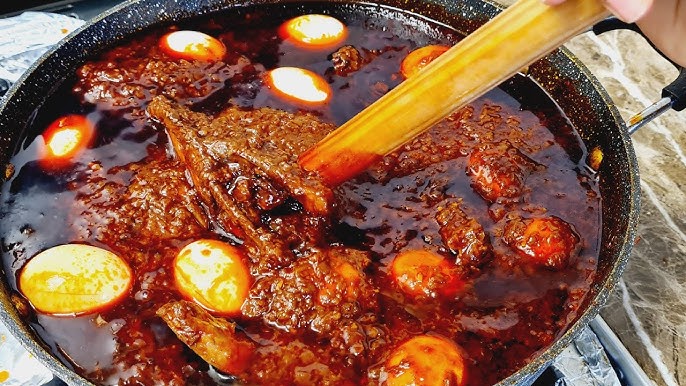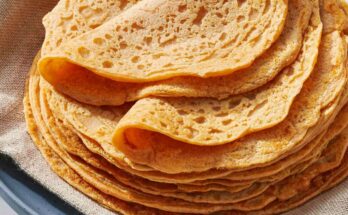Doro Wat Recipe: There’s nothing quite like the deep, fiery, and comforting aroma of Doro Wat, Ethiopia’s beloved national dish. It’s a rich, slow-simmered chicken stew made with tender pieces of chicken, hard-boiled eggs, and an irresistible medley of caramelized onions, Ethiopian spices, and clarified spiced butter (niter kibbeh). This isn’t your everyday chicken stew—it’s a full-on flavor explosion that deserves your full attention.
Craving something bold and unforgettable? Then buckle up, because you’re about to discover exactly how to make Doro Wat like an Ethiopian grandma—yes, it’s that authentic. Let’s get cooking!
What is Doro Wat?
Doro Wat (sometimes spelled Doro Wot) is Ethiopia’s most iconic dish. At its core, it’s a spicy chicken stew that’s slow-cooked until the flavors melt together beautifully. The word “Doro” means chicken, and “Wat” refers to stew in Amharic (the national language of Ethiopia). Traditionally, it’s served during special holidays and festive occasions—especially Easter and Christmas.
What makes Doro Wat stand out is the depth of flavor: a perfect balance of heat, spice, and richness. The chicken is fall-off-the-bone tender, the eggs soak up the bold sauce, and every bite is packed with the earthy heat of berbere spice and the buttery aroma of niter kibbeh (a spiced clarified butter).
This isn’t a 30-minute weeknight meal—it’s a labor of love. But once you take that first bite, you’ll understand why it’s worth every second.
Why Doro Wat is Ethiopia’s Signature Dish
You can’t talk about Ethiopian food without mentioning Doro Wat. It’s that central to the country’s culinary culture. Think of it like Italy’s pasta, Mexico’s tacos, or Japan’s ramen. Doro Wat is more than food—it’s tradition, heritage, and celebration on a plate.
Families gather around large shared platters of injera (the spongy sour flatbread that’s used to scoop up the stew), digging in with their hands and sharing stories over the communal meal. That’s part of what makes it so special—it brings people together.
Its deep flavor, cultural relevance, and versatility have earned it the title of Ethiopia’s national dish. And once you’ve tasted it, you’ll see why it’s remained beloved for generations.
The Unique Flavors of Ethiopian Cuisine
Before we dive into the recipe, it helps to understand the foundation of Ethiopian cooking. Ethiopian cuisine is all about bold, robust, and earthy flavors. A few ingredients define the cuisine:
- Berbere: A fiery red spice blend made with chili peppers, garlic, ginger, fenugreek, cardamom, cloves, and more.
- Niter Kibbeh: Clarified butter infused with onions, garlic, ginger, and spices like turmeric and cumin.
- Injera: A sour, spongy flatbread made from teff flour that’s both plate and utensil.
Ethiopian food is typically plant-based during fasting days (no meat or dairy), but during special occasions, rich meat dishes like Doro Wat take center stage. The layering of spices and slow-cooking techniques create complex flavors that keep you going back for more.
What Makes Doro Wat So Special?
So, what’s the big deal with Doro Wat? Here’s what sets it apart:
- Deeply caramelized onions: They’re not just sautéed—they’re slowly cooked until they turn into a dark, jammy base that carries the entire dish.
- Bold spice: Berbere isn’t just hot—it’s aromatic, layered, and complex.
- Rich texture: Niter kibbeh adds luxurious body and aroma.
- Eggs as flavor sponges: Hard-boiled eggs soak up the spicy sauce, creating little flavor bombs.
- Injera pairing: The tangy injera perfectly balances the heat and richness of the stew.
It’s a dish that hits every note—savory, spicy, tangy, and rich—all at once. No shortcuts. No substitutes. Just bold, beautiful, unforgettable food.
List of Ingredients You’ll Need
Let’s get real: Doro Wat has a few specialty ingredients. But trust me, they’re worth sourcing for an authentic taste. Here’s your complete shopping list:
Main Ingredients
- 3–4 lbs bone-in chicken (drumsticks, thighs, or a whole chicken cut into pieces)
- 6–8 large onions (yes, you read that right)
- 6 hard-boiled eggs
- ¼ cup niter kibbeh (Ethiopian spiced clarified butter)
- 2 tbsp vegetable oil (optional, if needed)
- 1–2 cups chicken broth or water
Spices & Seasonings
- 3–4 tbsp berbere spice mix (adjust to taste)
- 1 tbsp minced garlic
- 1 tbsp grated fresh ginger
- Salt, to taste
- Black pepper, to taste
- 2 tbsp lemon juice (for marinating the chicken)
Optional Ingredients
- 1 tsp paprika (for extra color)
- 1 tsp cayenne pepper (for added heat)
- 1 tsp ground cardamom (for added aroma)
Now that your pantry is ready, let’s dive into the prep!
Choosing the Right Chicken for Doro Wat
The beauty of Doro Wat lies in its bone-in chicken. Don’t go for boneless, skinless cuts—you’ll miss out on all the richness and flavor that comes from slow-cooking meat on the bone. Ideally, you want a whole chicken, cut into traditional 12 pieces (called doro chechebsa), but drumsticks and thighs work great too.
The key is marination. Soak the chicken in lemon juice and salt for about 30–60 minutes before cooking. This removes any gamey flavor and helps the meat absorb all the delicious spices later on.
Also, don’t forget to make small slits in the chicken. Why? So the spices can sneak into every nook and cranny—maximum flavor penetration!
The Role of Berbere Spice Blend
Berbere is the heart and soul of Doro Wat. Without it, you’re not cooking Doro Wat—plain and simple. This powerful, deep red spice blend is Ethiopia’s most famous seasoning, and for good reason. It’s a complex mixture that typically includes:
- Dried chili peppers
- Paprika
- Garlic powder
- Ginger
- Fenugreek
- Coriander
- Cinnamon
- Cloves
- Cardamom
- Allspice
It’s both spicy and aromatic, with sweet and earthy undertones. Think of it as a spicier cousin of curry powder—but uniquely Ethiopian.
You can find Berbere at African or specialty spice markets, or even online. Or better yet, make your own if you’re feeling adventurous. A homemade blend means full control over the heat and flavor balance.
Pro tip: Start with 2 tablespoons of Berbere and add more as your taste buds demand. Some like it fiery, others prefer a more balanced heat. Either way, make sure it’s a fresh batch for maximum flavor.
What is Niter Kibbeh and Why It’s Essential
Niter Kibbeh is to Ethiopian cooking what ghee is to Indian cuisine—but even more flavorful. It’s clarified butter that’s infused with spices like:
- Garlic
- Onion
- Ginger
- Turmeric
- Fenugreek
- Basil
- Cumin
- Cardamom
Making Niter Kibbeh from scratch is a bit of a process, but totally worth it. You simmer unsalted butter with all those aromatics, then strain it to remove solids. What you’re left with is liquid gold—a fragrant, spiced butter that forms the rich foundation of Doro Wat.
If you don’t have time to make it from scratch, you can use ghee as a substitute, but it won’t deliver the same complex flavors. Some Ethiopian markets even sell pre-made Niter Kibbeh in jars.
Bottom line: Don’t skip this ingredient. It’s what gives Doro Wat its soul.
How to Prepare Hard-Boiled Eggs for Doro Wat
The eggs in Doro Wat aren’t just an afterthought—they’re part of the main event. Traditionally, each person gets one egg served with their portion of stew. These eggs act like flavor magnets, absorbing the spicy sauce and providing a creamy contrast to the bold stew.
Here’s how to prepare them:
- Place 6 eggs in a saucepan and cover with water.
- Bring to a boil, then reduce heat and simmer for 10 minutes.
- Transfer the eggs to an ice bath to cool quickly.
- Peel the eggs and gently score them with a knife (this helps the sauce soak in).
Don’t skip the scoring part—it makes a huge difference. The little cuts let all that spiced sauce sneak inside, making each bite unforgettable.
You’ll add these eggs toward the end of cooking, giving them enough time to absorb the flavor without turning rubbery.
Step-by-Step Cooking Instructions
Alright, the prep’s done. Let’s move on to the real magic. Making Doro Wat from scratch takes time, patience, and love—but the payoff is so worth it. Here’s how to cook it step-by-step:
Step 1: Marinate the Chicken
Begin by seasoning your chicken pieces with salt, pepper, lemon juice, and a spoonful of berbere spice if desired. Let the chicken marinate for at least 30 minutes. This helps the flavors penetrate deeply and gives the final dish a richer taste. Longer marinating—up to a few hours—creates even better results.
Step 2: Prepare the Onions
Finely chop a generous amount of red onions. Heat a large pot over medium-low heat and add the onions without oil. Slowly cook them down, allowing their moisture to release. This slow-cooking method is traditional and creates a sweet, deeply caramelized flavor base. Stir frequently to prevent burning.
Step 3: Add Berbere & Simmer
Once the onions have turned soft and slightly brown, stir in a few tablespoons of berbere spice. Mix well until the onions are fully coated. Add a small splash of water to prevent sticking. Let this mixture simmer for several minutes to bloom the spices and create a thick, fragrant sauce.
Step 4: Stir in the Niter Kibbeh
Add a generous amount of melted niter kibbeh—a spiced Ethiopian clarified butter. Stir until it blends smoothly with the onion-berbere mixture. This step gives the dish its signature richness and deep, layered flavor.
Step 5: Add Chicken and Simmer Again
Add the marinated chicken pieces to the pot and coat them thoroughly with the sauce. Pour in enough water or broth to partially submerge the chicken. Cover and simmer on low heat for 30–40 minutes, or until the chicken becomes tender and infused with flavor.
Step 6: Add Eggs & Finish Cooking
Add peeled hard-boiled eggs to the pot, gently stirring them into the sauce. Let everything simmer for an additional 10–15 minutes so the eggs absorb the spicy, buttery flavors. Serve hot with injera or rice for a comforting, aromatic meal.
How Long Does Doro Wat Take to Cook?
Let’s be honest—Doro Wat is not a quick meal. But that’s part of the charm.
Here’s a rough breakdown of the timeline:
| Stage | Time Estimate |
|---|---|
| Marinating Chicken | 30–60 minutes |
| Caramelizing Onions | 30–45 minutes |
| Cooking with Spices | 10–15 minutes |
| Simmering Chicken | 45–60 minutes |
| Finishing with Eggs | 10–15 minutes |
| Total Time | 2.5–3 hours |
This dish is best when made on a weekend or special day when you have time to enjoy the process. Think of it like slow food—it rewards your patience with deep, unforgettable flavor.
You can also prepare components ahead of time (like boiling the eggs or making the niter kibbeh), which helps reduce the cooking window.
Serving Suggestions: What to Eat with Doro Wat
Traditionally, Doro Wat is served with injera, the iconic Ethiopian sour flatbread. It’s soft, spongy, and slightly tangy—perfect for soaking up the stew’s spicy sauce. Here’s how you plate it up Ethiopian-style:
- Lay a large piece of injera on a communal platter.
- Spoon the Doro Wat onto the center.
- Place eggs around the edges.
- Add additional injera rolls on the side.
No utensils needed—you tear pieces of injera and use them to scoop the stew, sharing from the same plate. It’s all about connection, conversation, and shared experience.
No injera? No problem. You can also serve Doro Wat with:
- Steamed rice
- Flatbreads like naan or pita
- Couscous or quinoa (less traditional but effective)
And don’t forget a simple side salad or stewed greens like gomen (Ethiopian collard greens) to balance the richness.
Tips for Making the Perfect Doro Wat
Getting Doro Wat just right is all about technique, timing, and patience. If you want that rich, bold, deep flavor that’s packed into every bite, follow these tried-and-true tips:
1. Don’t Rush the Onions
This might be the single most important part. Caramelizing onions properly is not about browning them quickly—it’s about slowly cooking them down until they’re deeply golden and almost jam-like. It can take up to 45 minutes or more, but the rich umami they bring to the dish is worth every second.
2. Use Bone-In Chicken
Doro Wat is traditionally made with whole, bone-in chicken pieces. The bones add flavor, and the meat stays tender and juicy throughout the long simmer. Boneless chicken just doesn’t hold up the same way.
3. Score the Eggs
Make shallow cuts in the boiled eggs before adding them to the stew. This helps them absorb all the spicy, buttery goodness and makes each bite more flavorful.
4. Taste and Adjust
Everyone’s spice tolerance is different, and berbere blends can vary. Start with a smaller amount and build up to your preferred heat level. Also, adjust salt and broth as needed to balance the flavors.
5. Let it Rest
Just like a good curry or chili, Doro Wat actually tastes even better the next day. The flavors deepen and meld together overnight. So, if you have the time, consider making it ahead of time and reheating it before serving.
Common Mistakes to Avoid
Even though Doro Wat isn’t complicated, there are a few mistakes that can affect the outcome. Avoid these common pitfalls to make sure your stew turns out perfectly every time:
1. Using Raw Onions Too Quickly
Never skip the step of slowly cooking the onions until they’re soft and dark. Throwing in raw onions and expecting them to “cook in the sauce” will leave you with a sharp taste and watery stew.
2. Using Too Much Liquid
Doro Wat should have a thick, rich consistency—not be soupy. Add your broth slowly and let it reduce gradually. You’re aiming for a sauce that clings to the chicken and eggs.
3. Skipping Niter Kibbeh
Regular butter or oil simply won’t deliver the same complex flavor. If you can’t find niter kibbeh, take the time to make it at home. It elevates the dish and brings that authentic Ethiopian touch.
4. Not Marinating the Chicken
Even a 30-minute lemon juice marinade helps tenderize the chicken and enhances flavor absorption. Skipping this step results in bland meat, even if the sauce is on point.
5. Using Store-Bought Berbere Without Tasting
Berbere spice blends can vary a lot in heat and flavor. Some are mild, others are fiery. Always taste a pinch before adding it all to your stew. Start slow—you can always add more, but you can’t take it out once it’s in.
How to Store and Reheat Leftovers
Doro Wat is one of those magical dishes that tastes even better the next day. The spices have more time to mingle, the sauce deepens in flavor, and the chicken becomes even more tender. Here’s how to handle leftovers like a pro:
Storing:
- Let the stew cool completely before storing.
- Transfer to an airtight container.
- Store in the refrigerator for up to 4–5 days.
- For longer storage, freeze in portions for up to 2–3 months.
Reheating:
- For best results, reheat slowly on the stovetop over low heat.
- Add a splash of water or broth if the sauce has thickened too much.
- Stir frequently to avoid sticking or burning.
- If using a microwave, cover the dish and heat in short bursts, stirring between each.
Important: Always reheat the dish thoroughly until it’s steaming hot all the way through, especially if it contains eggs or bone-in chicken.
FAQs about Doro Wat Recipe
1. Is Doro Wat spicy?
Yes, Doro Wat has a good amount of heat thanks to berbere spice, which contains chili peppers. However, you can adjust the amount of berbere used to control the spice level. For a milder version, start with less and add more gradually to taste.
2. Can I make Doro Wat without Berbere?
Technically, you could make a chicken stew without berbere, but it wouldn’t be Doro Wat. Berbere is essential for the authentic flavor. You can make your own if you can’t find it in stores—there are many recipes online.
3. Is Doro Wat gluten-free?
Yes, the stew itself is naturally gluten-free. Just be mindful of your sides—injera is traditionally made with teff flour (which is gluten-free), but some store-bought versions may include wheat. Always check the labels if you’re gluten-sensitive.
4. What’s a good substitute for Niter Kibbeh?
If you can’t find or make niter kibbeh, the closest substitute is ghee (clarified butter). For more flavor, infuse the ghee with garlic, onion, and a few whole spices like cardamom and fenugreek. It won’t be exactly the same, but it’s a solid backup.
5. Can I make it in a slow cooker?
Absolutely! After caramelizing the onions and adding the spices, transfer everything to a slow cooker along with the chicken and eggs. Cook on low for 6–8 hours. You’ll still get that deep flavor with less active time.
Conclusion
Doro Wat isn’t just a recipe—it’s a cultural experience. It’s bold, rich, deeply spiced, and absolutely unforgettable. From the slow-cooked onions to the fiery berbere and the buttery niter kibbeh, every element of this stew tells a story of tradition, patience, and love. Whether you’re new to Ethiopian cuisine or you grew up with injera on the table, mastering Doro Wat brings the heart of Ethiopia right into your home kitchen.
It may not be a 30-minute meal, but it’s absolutely worth the time. Serve it with injera, share it with loved ones, and let it warm your soul from the inside out. Once you try it, it’ll be in your cooking rotation forever.
So go ahead—gather your ingredients, carve out a couple of hours, and make this unforgettable dish. You won’t regret it.



